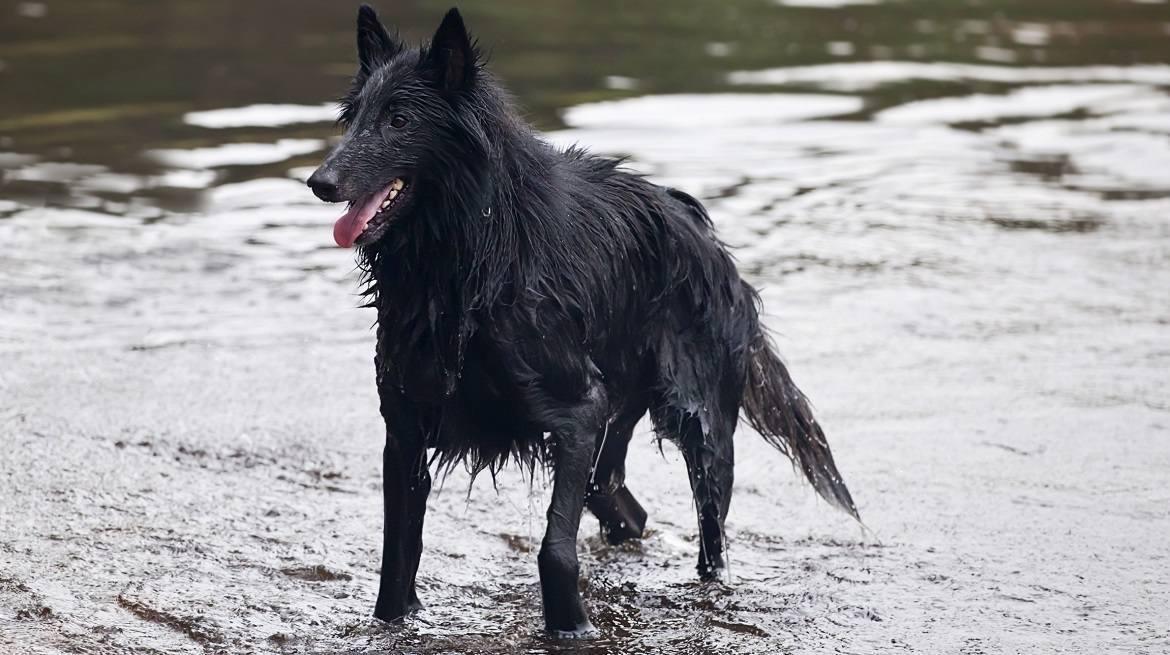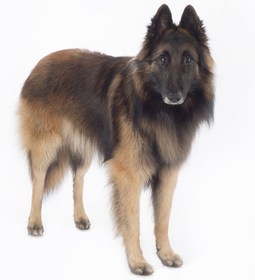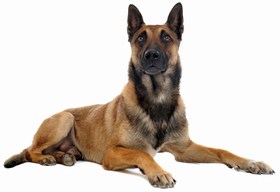
Paws ‘N’ Pups Quickview
Size
| Energy Level
| Trainability
| Paws ‘N’ Pups Rank
|
Characteristics
| Physical Characteristics: Height: 22-26” Weight: 60-75 lbs. Energy Level: Very High | Colors: The American Kennel Club recognizes the Belgian Sheepdog in the following colors:
|
Health & Longevity
Average Life Span: 10-12 years
The Belgian Sheepdog is a healthy breed, but there are some health conditions they may potentially experience.
Joint problems like hip and elbow dysplasia affect some Belgian Sheepdogs. Elbow dysplasia is the result of a malformed elbow joint causing discomfort, pain, and limping. In severe cases, lameness can occur; surgery may be required in these instances. Similarly, hip dysplasia occurs when the hip joint is malformed, preventing the thighbone from fitting properly into place. Results can vary from discomfort to arthritis and lameness, and surgery may be necessary in the most severe cases. Dogs with hip dysplasia should not be bred, so ensure that your puppy’s parents have no history of the condition. Although it is hereditary, hip dysplasia can be triggered by rapid weight gain and injury. Both conditions are degenerative.
Hypothyroidism, a condition in which the thyroid gland does not produce sufficient amounts of hormones, may also be experienced by some Belgian Sheepdogs. Hypothyroidism can lead to health issues like obesity, infertility, lethargy, and hair loss. It can be treated with daily medication for the duration of the affected dog’s lifetime.
Eye problems like Progressive Retinal Atrophy (PRA) and cataracts have been reported in some Belgian Sheepdogs. PRA is the gradual degeneration of the retina, ultimately resulting in failed daytime vision. There is no cure for PRA, but dogs with this condition typically continue to lead happy lives.
More severe health problems known to some Belgian Sheepdogs include epilepsy and cancer, particularly stomach cancer. Treatment for cancer can include surgical removal of tumors, chemotherapy, or both medical and surgical solutions.
Some Belgian Sheepdogs also have anesthesia sensitivity, which is something that should be addressed with your veterinarian.
The average lifespan for the Belgian Sheepdog is 10-12 years.
Temperament & Train-ability
The Belgian Sheepdog is serious, intelligent, and brave. He is also elegant, graceful, and athletic, and he has been described as “constantly in motion.” He makes a loving and loyal family companion, but he is not recommended for a first-time dog owner because he is a sensitive dog with the capacity to become shy or strong-willed.
The Belgian Sheepdog is a working dog who excels in obedience, herding, and agility. As such, he is very high energy and needs a minimum of sixty minutes of exercise each day. Ideally, he would be utilized as a herding dog, but jogs, walks, and room to run are sufficient. He should not live in an apartment, but should be placed in a home with a securely fenced yard. The Belgian Sheepdog will chase essentially anything that moves if given the opportunity, so be sure he is fenced or leashed at all times outdoors. Despite his size and high energy levels, the Belgian Sheepdog needs companionship and attention and should live indoors with his family. He is a gentle, loving, family companion who should not be left alone for extended periods of time. If he gets lonely and develops separation anxiety, he is likely to become destructive.
The intelligent Belgian Sheepdog can also become destructive when bored; he needs both physical and mental stimulation. Interactive play, puzzle toys, and challenging training sessions can give this breed the stimulation they require. The Belgian Sheepdog will likely be demanding of your time and attention, so do not purchase this breed if you hope for an independent, low maintenance dog.
Socialization at a young age with a variety of people, animals, places, smells, and sounds is important for the Belgian Sheepdog. He is loving and protective of children in his own family, but he may think unfamiliar children are showing aggression when they are noisy or rough, and he is likely to nip at them. He can also be suspicious of strangers, and this distrust can develop into aggression if he is not properly socialized and trained as a puppy. However, this quality does make him an excellent watchdog and guard dog who will go to great lengths to protect his family. The Belgian Sheepdog will get along well with cats and other dogs if they are raised together, but he will likely chase other small animals.
Early, consistent training is necessary for the Belgian Sheepdog. Although he is highly intelligent, athletic, and trainable, he can be extremely strong-willed. It is important that your Belgian Sheepdog trusts and respects you. Keep sessions fun, upbeat, short, and positive to maintain your Belgian Sheepdog’s engagement. Use positive reinforcement like treats or extra playtime. This breed loves to play, so incorporating playtime can be an excellent way to make training go more smoothly. It is also a good idea to not be overly repetitive and to continue challenging your Belgian Sheepdog, as they crave mental stimulation. Be encouraging and give your Belgian Sheepdog plenty of praise when earned, and do not be overly critical or physical. This breed is very sensitive to criticism and harsh treatment.
Grooming
The Belgian Sheepdog sheds moderately year-round, and he needs 15-20 minutes of brushing each week. He experiences at least one heavy shed annually, but timing will depend on the climate in which he lives. During this period of heavier shed, more frequent brushing will be required, and warm baths will help remove excess dead hair.
Bathe the Belgian Sheepdog as needed, and trim his toenails when they grow long enough to touch the floor. Check his ears weekly for signs of infection like redness, tenderness, and odor. Brush his teeth 2-3 times each week to maintain healthy gums and prevent bad breath.
Diet
On average, the Belgian Sheepdog should eat 2-3 cups of high quality, dry dog food each day. The ideal type and amount of food for your individual dog will depend on factors like age, weight, metabolism, and activity level.
Ensure that your Belgian Sheepdog always has access to clean, fresh drinking water.
Looking for a Belgian Sheepdog?
 Find A Belgian Sheepdog Breeder |  Belgian Sheepdog Puppies For Sale |  Adopt A Belgian Sheepdog |
Cost
The average price for a Belgian Sheepdog is about $1,100. Pricing may vary according to gender, breeder location, pedigree, and if the pup is considered pet quality or show quality.
If you are able to adopt a Belgian Sheepdog, expect to pay up to $175 in adoption fees.
Paws ‘N’ Pups Ranking
Paws ‘N’ Pups ranks every breed out of 4 with 1 being easiest to integrate into your life and 4 being the toughest – The lower the ranking the better.
Ranking takes into account a few basic factors including cost, skill level needed, high vs low maintenance and how critical regular training is to success. The Belgian Sheepdog ranks a 4. He is an excellent family companion and guard dog, and he is generally healthy. However, he demands a significant amount of time, attention, exercise, and mental stimulation, and he is a challenging breed to train. He also needs extensive early socialization to ensure appropriate behavior with children, strangers, dogs, and other pets.
Breeds Similar To Belgian Sheepdog
 Belgian Tervuren |  German Shepherd |  Belgian Laekenois |  Belgian Malinois |




